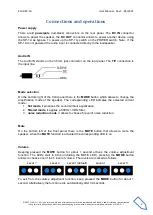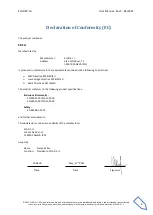
ELAD SP-1A
User Manual - Rev 2 - 05/2021
© 2021 ELAD S.r.l. All rights reserved. No part of this document may be reproduced, published, used, disclosed or disseminated
in any form or by any means, electronic, photocopying or otherwise, without prior written permission of ELAD S.r.l.
2
Connections and operations
Power supply
There are
2 powerpole
(red-black) connectors on the rear panel. The
DC IN
connector
allows to power the speaker, the
DC OUT
connector allows to power another device using
the SP-1A as bypass. To power up the SP-1A, switch on the POWER switch. Note : if the
SP-1A is not powered the audio input is connected directly to the loudspeaker.
Audio IN
The Audio IN stands on the 3.5mm jack connector on the rear panel. The
TIP
connection is
the input line.
Mode selection
On the bottom right of the front panel there is the
MODE
button which allows to change the
amplification mode of the speaker. The corresponding LED indicates the selected current
mode :
1.
flat mode
, it produces the sound without equalization,
2.
filtered mode
, it applies a 300Hz ÷ 3kHz filter,
3.
noise reduction mode
, it allows to choose 5 level of noise reduction.
Mute
On the bottom left of the front panel there is the
MUTE
button that allows to mute the
speaker, when the
MUTE
function is activated the corresponding LED is on.
Volume
Keeping pressed the
MUTE
button for about 1 second actives the volume adjustment
function. The LEDs start to blink (including the MUTE LED), pressing the
MODE
button
allows to choose one of the 5 level of volume. The levels are marked as follows :
Level 1 Level 2 Level 3 (default) Level 4 Level 5
To exit from the volume adjustment function, keep pressed the
MODE
button for about 1
second, alternatively the function exits automatically after 30 seconds.






















